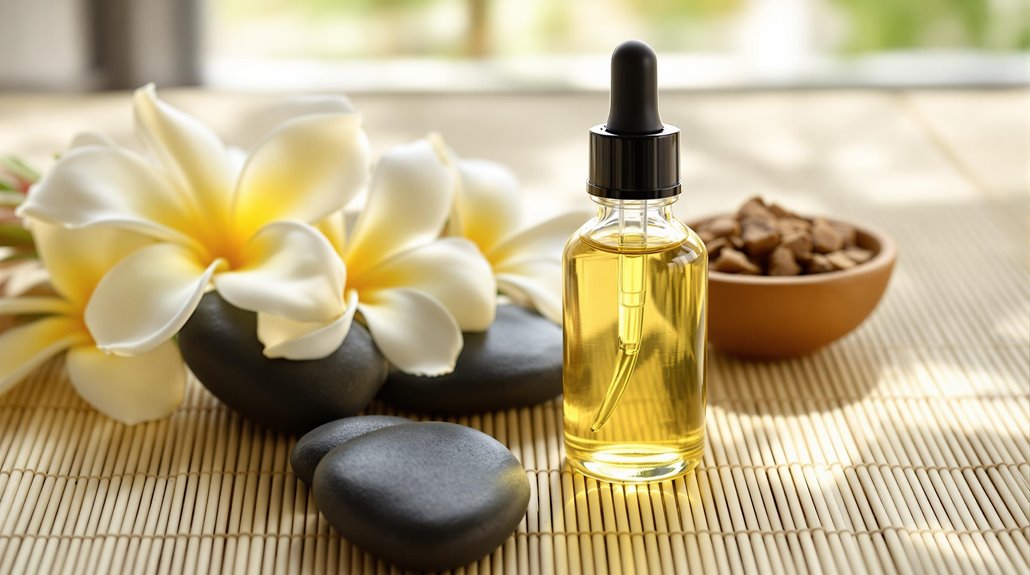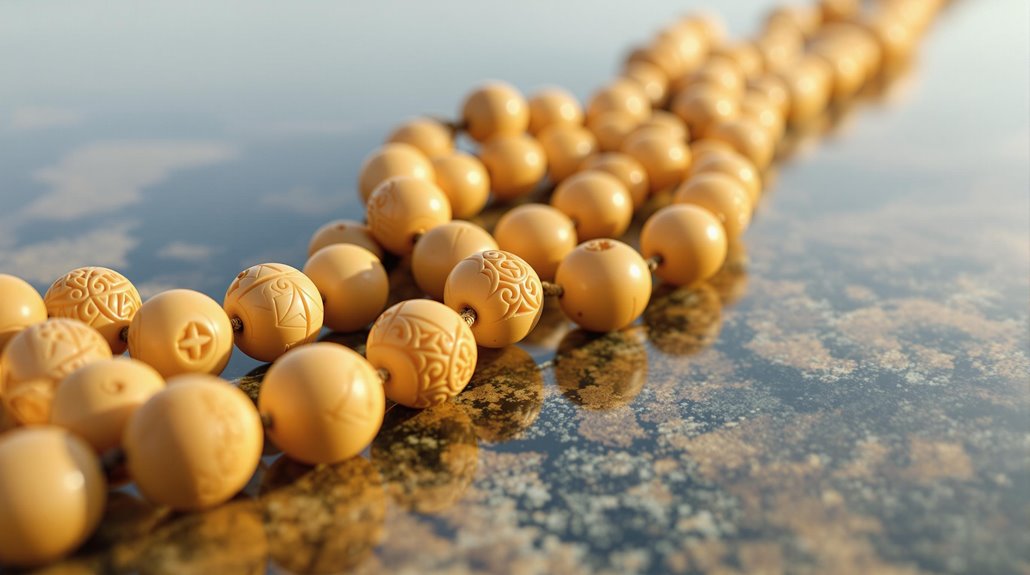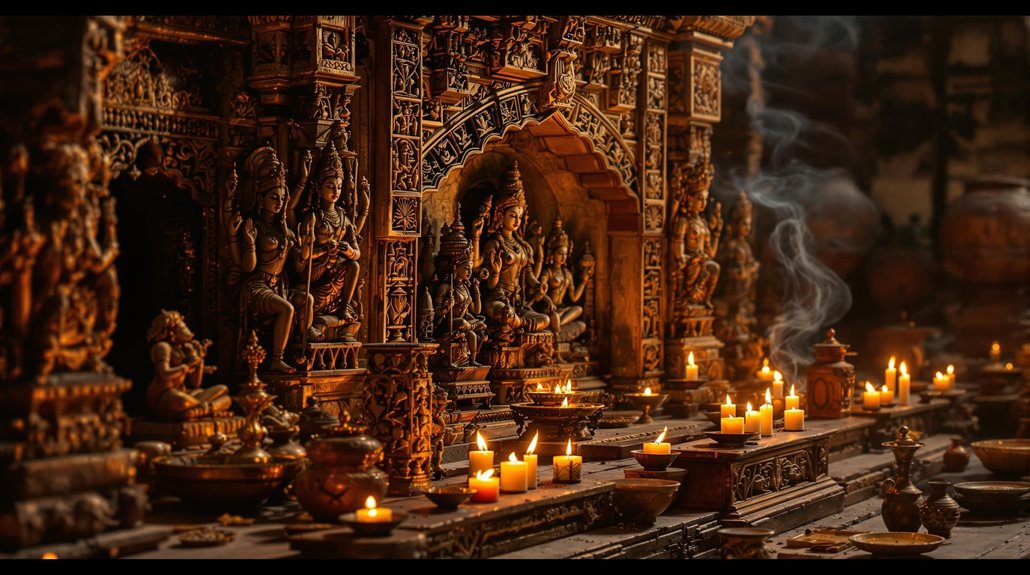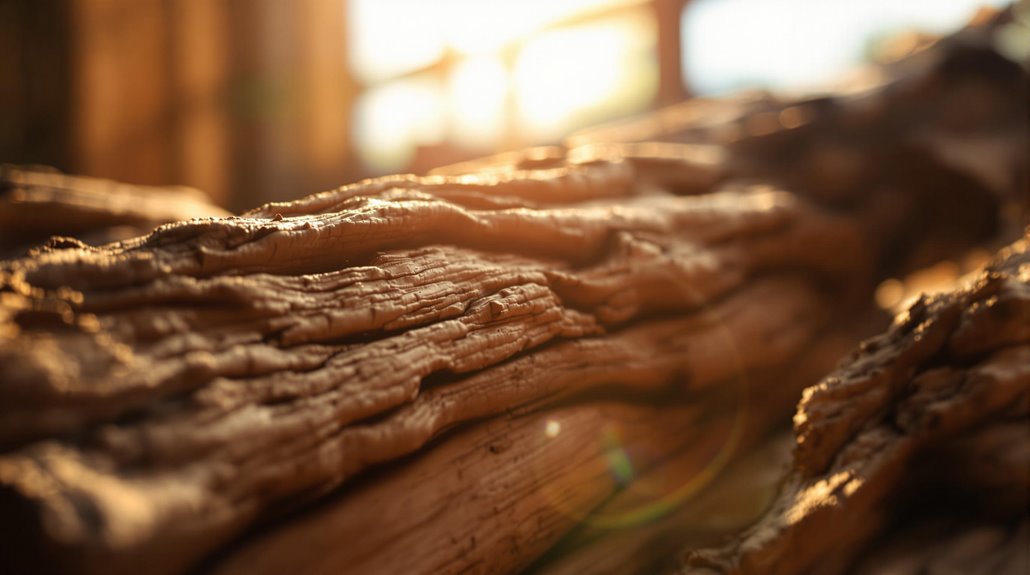Why Some Cultures Believe Sandalwood Brings Luck in Gambling
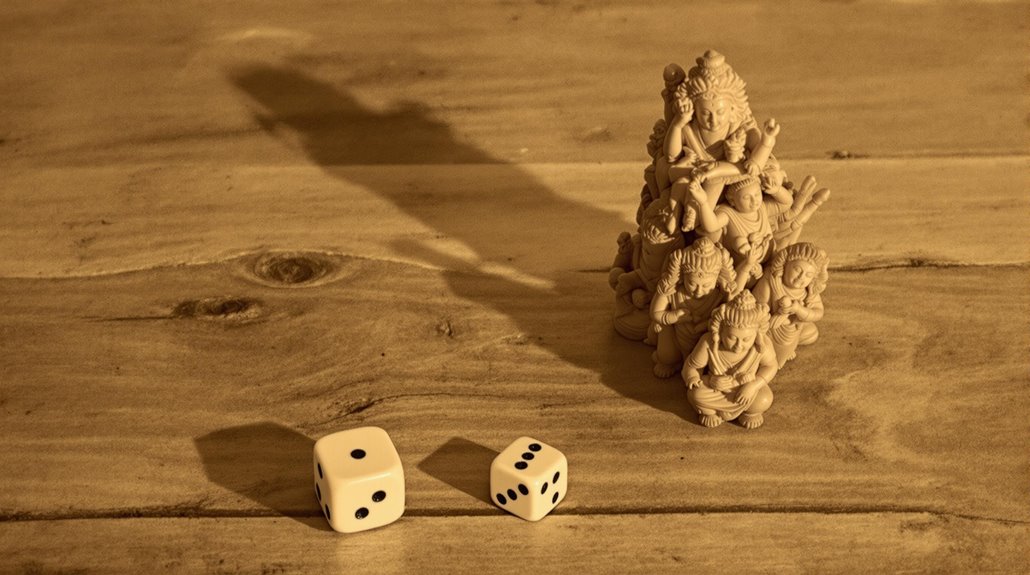
Across ancient cultures, the fragrant and calming sandalwood has long been revered for its purported ability to bring good luck, especially in gambling ventures. The scent's soothing properties are believed to induce focus and clarity, aiding decision-making. Sandalwood's natural resistance and longevity are seen as symbols of endurance and resilience, contributing to its reputation as a lucky charm.
Gamblers incorporate sandalwood into rituals and talismans, hoping to ward off negative energies and attract prosperity. While the scientific validity of these claims remains debated, the mystique surrounding sandalwood's luck-bringing properties continues to fascinate.
The Spiritual and Mystical Properties of Sandalwood
Why have sandalwood and its spiritual properties been the subject of reverence and fascination for centuries? Sandalwood is imbued with a deep spiritual significance, its fragrance and symbolic meaning deeply intertwined with many ancient cultures and belief systems. For millennia, the warm, earthy aroma of this precious wood has been revered for its calming and meditative properties, aiding in the attainment of deeper states of consciousness. In Hindu and Buddhist traditions, sandalwood is used extensively in religious ceremonies, its smoke believed to purify the mind and body, facilitating a closer connection to the divine. The oil extracted from the wood is also prized for its therapeutic and aromatic qualities, promoting relaxation and inner peace.
Beyond its spiritual associations, sandalwood has long been considered a symbol of purity, humility, and enlightenment, its natural beauty and versatility inspiring reverence and wonder in those who encounter its enchanting presence. The wood's stress-relieving properties have been scientifically validated through aromatherapy studies showing its effectiveness in treating anxiety, depression, and mental strain.
Sandalwood's Role in Cultural and Religious Practices
Across a multitude of cultural and religious traditions, sandalwood has long played a central role in sacred rituals and ceremonies. Its fragrant and calming properties have made it an integral part of Hindu, Buddhist, and Zoroastrian practices. In Hinduism, sandalwood paste is used to create sacred marks on the forehead, while in Buddhism, it's burned as incense during meditation. Beyond its spiritual significance, sandalwood has also been prized for its traditional medicinal uses, with the oil extracted from the wood used to treat skin conditions and promote relaxation.
In parts of Asia, the cultural significance of sandalwood extends to the sphere of gambling, where it's believed to bring good luck. This belief stems from the wood's perceived mystical qualities, which are thought to imbue those who use it with protection and prosperity. Whether incorporated into ritual activities or used as a lucky charm, sandalwood's enduring presence in cultural and religious milieux speaks to its deep-rooted importance across diverse traditions. Some practitioners even believe that writing wishes on sandalwood and burning it will help manifest their desires into reality.
The Calming Effects of Sandalwood
Beyond its cultural and religious significance, sandalwood is also prized for its calming properties. The soothing scent of sandalwood has a significant effect on your mind and body, transporting you to a state of deep relaxation. The unique aroma of this precious wood contains compounds that interact with your olfactory system, triggering a cascade of physiological responses that promote calmness and tranquility.
When you inhale the warm, earthy scent of sandalwood, it activates neural pathways that signal your brain to release neurotransmitters associated with relaxation, such as serotonin and dopamine. This, in turn, lowers your heart rate, blood pressure, and stress levels, leaving you feeling centered and grounded. Many use sandalwood essential oil or incense to create a serene environment, whether it's for meditation, yoga, or simply unwinding after a long day. The calming effects of sandalwood can also enhance sleep quality, helping you drift off into a restful slumber. The practice of using burning sandalwood incense has been shown to effectively heal both body and mind while naturally elevating one's mood.
The Fragrance of Sandalwood and Its Influence
Although the calming scent of sandalwood has long been revered, its fragrance can also influence various aspects of human behavior and perception. The aromatic characteristics of sandalwood, with its warm, woody, and slightly sweet notes, have the ability to evoke powerful olfactory experiences. These olfactory experiences can, in turn, shape our beliefs, attitudes, and even decision-making processes.
Numerous studies have suggested that the fragrance of sandalwood can elicit a sense of well-being and positivity, which may contribute to the belief that it brings good luck, especially in gambling surroundings. The pleasant aroma of sandalwood is thought to induce a state of relaxation and optimism, potentially influencing the gambler's mindset and, ultimately, their decisions. This connection between the fragrance of sandalwood and the perception of luck or fortune has become deeply rooted in the cultural traditions of certain societies, where the use of sandalwood in various rituals and ceremonies reflects its revered status as a lucky charm.
The oil's anti-anxiety properties have made it particularly valued in high-stress environments like gambling establishments, where maintaining emotional balance is crucial.
Sandalwood's Reputation as a Lucky Charm

Sandalwood's reputation as a lucky charm has long been a part of various cultural traditions. Ancient beliefs attribute the wood's comprehensive properties to its ability to bring good fortune, especially in gambling. Many believe that carrying a piece of sandalwood or placing it near a gambling table can enhance one's luck and increase the chances of winning.
The calming and grounding scent of sandalwood is thought to induce a state of focus and clarity, allowing the gambler to make more informed decisions. Additionally, the wood's natural resistance to insects and its longevity are seen as symbols of endurance and resilience, qualities that are highly valued in the world of chance.
Across Asia and the Middle East, sandalwood is often incorporated into rituals and talismans, with the belief that its presence can ward off negative energies and attract prosperity. This reputation has endured through the centuries, making sandalwood a cherished item in the arsenal of the superstitious gambler. The practice of deep breathing techniques with sandalwood is believed to promote mental clarity and energy balance, potentially improving decision-making abilities during games of chance.
Exploring the Beliefs Around Sandalwood's Luck-Bringing Powers
The belief in sandalwood's luck-bringing powers extends far beyond its calming aroma and natural durability. Rooted in sandalwood's folk history, this cultural symbolism has become deeply intertwined with gambling and financial success across various regions.
In many Asian cultures, sandalwood is revered for its spiritual and protective properties. Its rich, woody scent is believed to invoke the presence of deities, and its resilience symbolizes endurance and longevity. These attributes have led to the perception that sandalwood can bring good fortune, prosperity, and luck to those who possess it.
Gamblers often incorporate sandalwood into their rituals, carrying carved figurines or incense to invoke the wood's mystical powers. Its presence is thought to enhance concentration, clear the mind, and attract positive energy, all of which are believed to improve one's chances of winning. Whether used as talismans, décor, or offerings, sandalwood's symbolic significance in the area of gambling is a testament to its deeply rooted cultural legacy. Traditional practitioners believe wearing sandalwood bead necklaces during meditation can enhance clairvoyance and divination abilities, further strengthening their connection to fortune and fate.
The Debate Over the Scientific Validity of Sandalwood's Luck

While many believe in sandalwood's luck-bringing powers, the scientific validity of these claims remains a subject of debate. Despite centuries of anecdotal evidence, rigorous statistical studies have yet to conclusively prove the efficacy of sandalwood in gambling or financial success.
The debate around sandalwood's luck-bringing properties centers on the following key points:
- Lack of Empirical Evidence: Extensive scientific research has failed to produce reliable, replicable data supporting the claimed benefits of sandalwood.
- Placebo Effect: Some argue that the perceived luck associated with sandalwood may be a result of the placebo effect, where belief alone influences outcomes.
- Cultural Bias: The strong cultural beliefs surrounding sandalwood may skew perceptions and make objective assessment challenging.
- Confounding Variables: It is difficult to isolate the impact of sandalwood from other factors that may influence gambling or financial success.
- Confirmation Bias: People may be more inclined to attribute positive outcomes to sandalwood, while dismissing negative results.
Ultimately, the scientific community remains divided on the validity of sandalwood's luck-bringing powers, underscoring the need for more rigorous, impartial investigations. Similar to how scented candles release aromatic molecules that interact with our senses, sandalwood's fragrance may influence our emotional state and perception of luck.
Gamblers' Pursuit of Sandalwood for an Edge
Despite the lack of scientific consensus, many gamblers continue to pursue sandalwood, believing it can provide an essential edge in their undertakings. They see the fragrant wood as a lucky charm, a talisman that can sway the fickle hand of fate in their favor. These superstitious beliefs are deeply ingrained, passed down through generations of gamblers seeking an advantage over the house.
Whether it's carrying a piece of sandalwood in their pocket or incorporating the wood into their rituals, these gamblers are convinced that the fragrant timber possesses a mystical power. They'll scour specialty shops and esoteric markets, paying premium prices for the prized wood, all in the hopes of tipping the odds in their favor. For them, the allure of sandalwood's perceived luck-enhancing properties is simply too strong to ignore, even in the face of skepticism from the scientific community. With annual price increases of 20% to 25%, these believers are willing to pay increasingly steep costs for their lucky tokens.
The Mystique Surrounding Sandalwood and Gambling
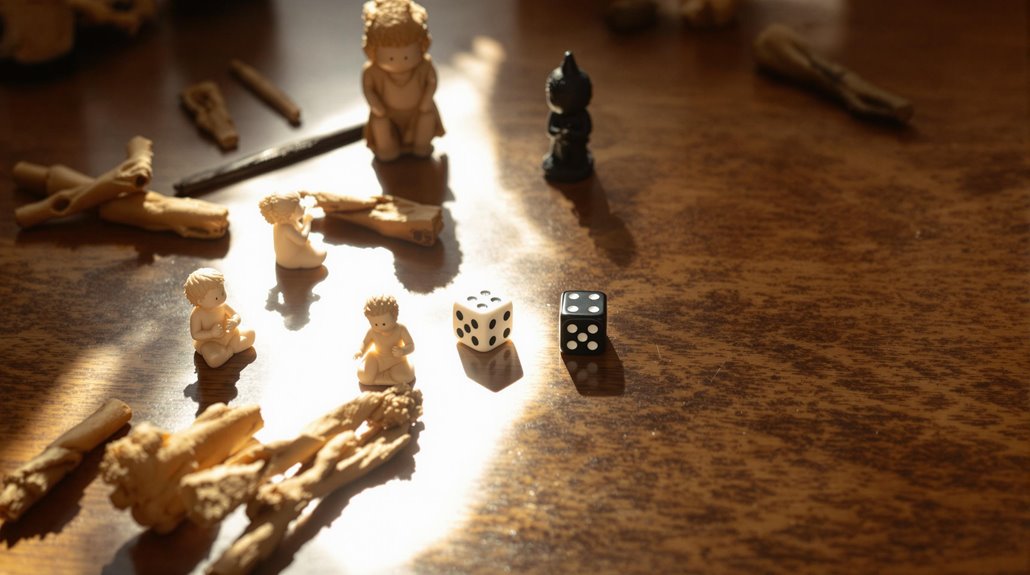
Sandalwood's mystique extends far beyond its alluring fragrance, permeating the high-stakes world of gambling. Gamblers from various cultures have long revered this ancient wood, believing it possesses the power to tip the scales in their favor. Why? It all boils down to sandalwood's calming properties and the deep cultural significance it holds.
- Sandalwood is thought to induce a state of tranquility, helping gamblers maintain a cool head and sharp focus amid the chaos of the casino.
- Its warm, earthy aroma is believed to attract positive energy and ward off negative influences, creating a fortuitous atmosphere for the roll of the dice.
- The wood's natural rarity and the labor-intensive process of harvesting it have imbued sandalwood with an almost mystical allure, further fueling its reputation as a lucky charm.
- Across Asia, sandalwood has long been revered for its spiritual and ceremonial uses, making it a natural fit for the high-stakes world of gambling.
- Gamblers who incorporate sandalwood into their rituals or carry small pieces as talismans do so in the hope of tipping the odds in their favor, driven by the wood's timeless mystique.
With prices reaching AU$ 16,000 per ton, the extreme value of sandalwood has only enhanced its reputation as a symbol of wealth and good fortune among gambling enthusiasts.
Investigating the Cultural Roots of Sandalwood's Luck Associations
Centuries of cultural traditions have woven sandalwood's associations with luck and good fortune. Across Asia, this fragrant wood has long been imbued with symbolic meaning, often linked to the divine and the auspicious. Exploring sandalwood's cultural symbolism reveals regional variations in beliefs about its powers.
In India, sandalwood is revered for its sacred and purifying properties, with its use in religious ceremonies and rituals believed to bring blessings and ward off negative forces. This sacred reputation has extended to the domain of gambling, where sandalwood is thought to bestow good luck and protect against losses. Similar beliefs exist in China, where the wood's natural warmth and earthy scent are seen as auspicious qualities that can enhance one's fortune.
Elsewhere in Southeast Asia, sandalwood's symbolic significance varies, with some cultures associating it with wealth, prosperity, and fertility. These diverse cultural roots help explain the widespread appeal of sandalwood as a talisman for gamblers seeking to sway the odds in their favor. The tradition of sandalwood cultivation dates back centuries, with East Timor forests being documented by Chinese traders as early as 1436.

